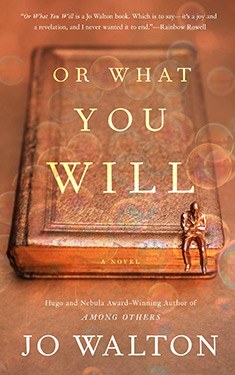Jo Walton
Completed 11/13/2022, Reviewed 11/13/2022
3 stars
I believe Jo Walton is the queen of meta. Her imagination when it comes to mixing the magical with the mundane self-referentially is quite amazing. This book is no exception. However, I found it a tougher read than most of her books. I could appreciate the brilliance that went into the concept, but I found the form hard to follow. I’d say it took me half the book to really sink my teeth into it, and shocked myself when I realized it took me two weeks to read the just over 300 pages. I think some people will really love this book and others will not. I’m in the in-between place. However, it did win the 2022 Mythopoeic Award.
The plot is tough to describe, but I’ll give it a try. Sylvia is an award-winning fantasy author who has cancer. She has an imaginary friend/inner voice who has been with her since childhood. This voice has appeared in all of Sylvia’s thirty novels. Now that she’s dying, the voice realizes that he too will disappear. He devises a plan to have Sylvia write herself into her next novel so that both she and he can be immortal. The location of the book is a Florence-like Italian city called Thalia. And the voice, as the character Pico, has already opened the doors of immortality in this world when he died in a previous novel set there. But the question is, can the voice convince Sylvia that this is a real possibility, not just a literary device.
The voice is the narrator, which can make things very confusing as you read the book. He often speaks in first person about his present interactions with Sylvia. He also narrates the book she is writing and tells the history of her life, including her painful childhood and abusive first marriage. There is something very autobiographical in the story of Sylvia’s life, but I don’t know enough about Walton to know if this is true or not. It is written, though, with such urgency and realism that it leaves the question open.
Another thing to be aware of is that Walton draws the characters of her book within a book from Shakespeare’s “Twelfth Night” and “The Tempest”. I’ve seen both several times, but only barely remember them. You don’t have to know the plays in depth, but it would be good to know the main characters, like Prospero, Miranda, and Caliban. She does a quickie summary of “Twelfth Night” to help with those characters. They all do come alive thanks to Walton’s wonderful prose, something I’ve always loved of hers.
The world-building is wonderful, making you feel immersed in both a Renaissance and present day Italy. Walton describes the city so well you can taste the gelato and entrees Sylvia gets and gives you an in-depth analysis of the cobblestone history of the roads. It’s truly magnificent writing.
Where I got lost was the jumping back and forth between the different times. There are two characters from the turn of the 1800s who through the action of the gods (Sylvia), send them back to this alternate Thalia of immortality. There, they encounter the destruction of Caliban and the political machinations of the rule of the city. Sylvia is writing this while actually in Italy, and the narrator takes you back and forth between the present and Thalia so subtly, I often didn’t realize where I was and who was speaking. We’d be following Sylvia as she waits for the delivery of a decent chair and then slide right back into Orsino figuring out what to do with his imprisoned half-brother.
I give this book three out of five stars. I really liked a lot about it, but found it difficult to follow. This is the eight or ninth novel of Walton’s I’ve read, and there hasn’t been a bad one in the bunch. This one was just hard to follow. Between books like this, Among Others, and My Real Children, I can say Walton does wonderful things writing about real issues for women. She also mixes genres in these books so that it’s hard to say if it’s regular or genre fiction. But the overall results are generally really impressive. I bet a lot of people will love this book, and it will have its detractors. I’d recommend this book to anyone who loves immersing themselves in books, loving them so much that you’d love to be inside one.

No comments:
Post a Comment